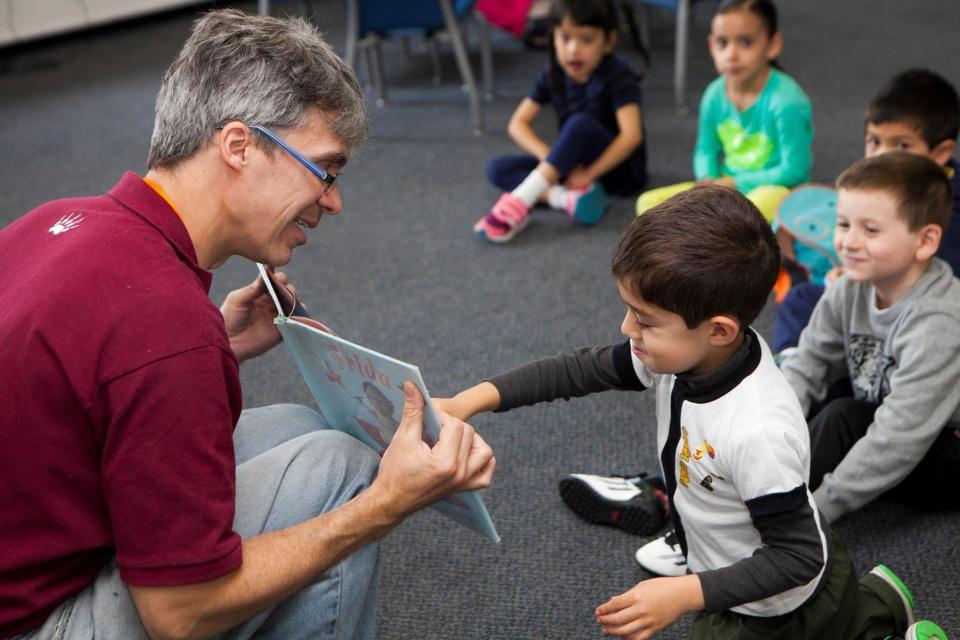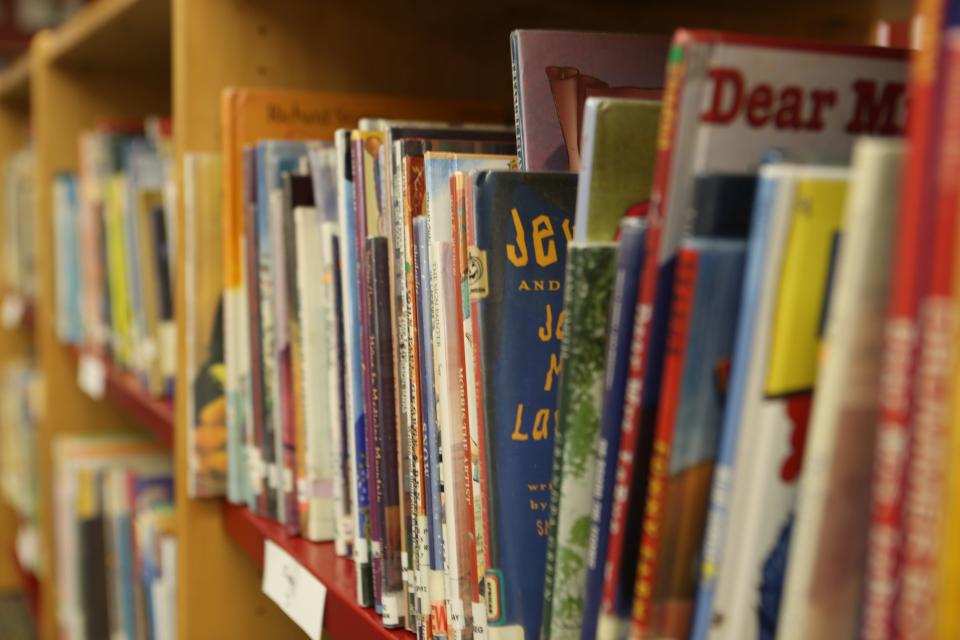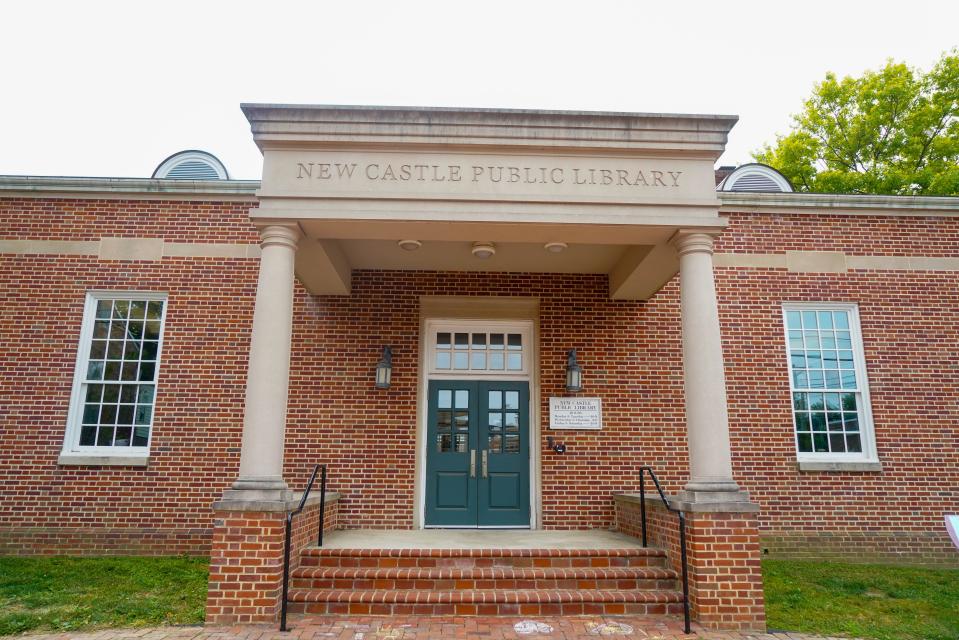Certified school librarians are disappearing in Delaware. How that's affecting students
Ray Oldenburg introduced the idea of "the third place" in the '80s.
According to the sociologist's theory, a third place is a location outside of one’s home and work or school – the first and second places – where people regularly come together and foster a sense of community.
Woodbridge High School librarian and former Delaware Association of School Librarians President Harry Brake believes that for students, that third space can be school libraries.
Students interviewed on the second episode of the school library's podcast “Due Knowledge” agreed. They wanted that respite from the busy school day, a place to unwind as well as get homework and studying done; “a second home,” as one student put it.
But for many students in Delaware’s public and charter schools, that was far from their reality.
One student interviewed said their school’s library was open only during the day to students taking a certain number of Advanced Placement courses. Another said that while the library was technically open during lunch, staff seemed to discourage students from visiting.

Part of the problem, Brake said, is that people both inside and outside schools have a misconception about the services that school libraries provide.
“This is not just a place where you check out books,” Brake said.
Certified professional librarians can give support to students and teachers alike, helping to bolster curriculum and providing resources for learning. They also provide a space for students to take mental health breaks, learn how to discern whether news or job application sites are credible and, at places like Woodbridge High School, access tools such as 3D printers.
But the number of full-time librarians – also called school library media specialists in Delaware code – has been dwindling.
Brake is one of only 108 full-time librarians employed in Delaware’s public and charter schools, according to public data. Many of these specialists have been working for over 30 years – and once they retire, Brake said he fears they won’t be replaced.
Already, not all schools have official libraries or have only one for the entire district. Most are staffed with paraeducators or other staff who lack the qualifications – namely, a master’s or doctoral degree in school library media – and often the time to effectively work with educators and students.
Educational resources are already spread thin, Delaware Division of Libraries Director Annie Norman said. Many schools do not have a specified library budget, and some have not gotten new books in years – or, in one case Norman helped to fix, decades.
Teachers have tried to put “band-aids” on the situation, digging into their own personal money to grow their classroom book collections to supplement the lack of library resources.
“Having quality school libraries is an equity issue,” Norman said.
What makes a quality school library?
The American Association of School Librarians’ standards are a good judge of whether a school library or district is operating to its full potential, experts say.
A recent Antioch University Seattle study funded by the Institute for Museum and Library Services used the American Association of School Librarians’ standards to guide an analysis of trends in school librarian employment nationwide.

The study found that the number of full-time librarians in Delaware declined by almost 24% between the 2009 and 2021 school years. It also found that no district in the state met the recommended ratio of one full-time librarian for every 500 students.
John Chrastka, executive director of the think tank EveryLibrary Institute, said that the quality of school libraries has been on the decline nationwide since the introduction of No Child Left Behind in 2001. The requirement to meet certain standards has left school libraries to fall to the wayside, he explained. And with continuous budget cuts for schools, libraries are some of the first programs to go.
Some individual schools in Delaware – primarily elementary and charter schools – do satisfy the guidelines for effective school libraries, according to state employment data.
But for the schools and districts that don’t − especially those where there may be a single librarian for an entire district − Norman said librarians lose the opportunity to get to know students individually, work closely with teachers and help inspire a love of reading.
This can have a lasting impact on children’s literacy and test scores.
The consequences of declining school libraries
Statewide assessments show Delaware students struggle with reading across the board. Only 40% of students in the third through eighth grades enrolled in public and charter schools scored at or above their grade’s proficiency level in English Language Arts this year. And in high school, only 44% of students scored proficient or higher on the reading section of the SAT.
Both of these score averages are lower than the year prior, continuing an ongoing trend of decreasing test scores in the wake of the pandemic.
TEST SCORES: Statewide test results 2023: Comparing top performances across Delaware school districts
Brake said it’s not just the pandemic, though. Multiple studies have found a correlation between school library budgets and standardized test scores.
But advocating for higher school library budgets – or more resources in general – has become harder in Delaware in recent years, Brake said. There is no longer a designated staff member focusing on school libraries within the Delaware Department of Education.
The last person to hold the position retired in 2013 and was never replaced. A Department of Education spokesperson said she could not speak to the exact reason because it was several administrations ago, but said the position was likely “repurposed.”
Chrastka, who works with school libraries in Delaware and nationwide, said that most states similarly lack a staff member dedicated to libraries in their Departments of Education. He said having someone in such a role − even part-time − "goes a long way" when it comes to making sure school libraries receive federal and state funding.
A new solution
After decades of advocating for better school libraries, both as a parent and a librarian herself, Norman said she and the Division of Public Libraries are trying to take matters into their own hands.
"We've always seen ourselves as a support to literacy but clearly, we need to take a stronger leadership role and really apply our expertise to this challenge,” Norman said. “And I am quite confident that if we are able to do so that the situation will improve dramatically.”

Norman’s solution? An integration of school libraries with the state’s public library system.
The department has already helped some school libraries expand their catalogs and created pilot partnerships, primarily with high school libraries. Norman said the goal of the partnerships is not to take control away from educators and school librarians, but rather to lessen the burden on them by processing and ordering new books they may need and giving students access to a wider swath of materials.
Chrastka and EveryLibrary have helped the Division of Public Libraries advocate for support for the catalog integration. He said that expanding books available to students − which does not necessarily include every book in the adult section − is key to inspiring independent reading among students. It also expands access to books for students' families who may not have a public library card.
“I don't think it should be standalone libraries anymore,” Norman said. “We all need to be connected, especially in a state the size of Delaware.”
Send story tips or ideas to Hannah Edelman at hedelman@delawareonline.com. For more reporting, follow them on Twitter at @h_edelman.
This article originally appeared on Delaware News Journal: Delaware's struggle to keep school librarians and support students

